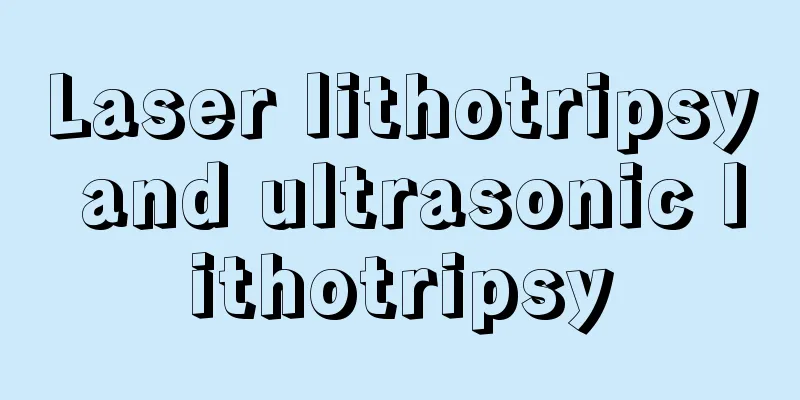Laser lithotripsy and ultrasonic lithotripsy

|
In the early stages of stone growth, the patient will not experience much pain. However, when the stone grows to a serious stage, the patient will be tortured by the stone and feel unbearable pain. Especially when stones grow in the urinary system, when the stones fall into the urethra, people will feel extremely painful. When the size of the stones exceeds a certain range, they can be treated with lithotripsy. Lithotripsy mainly includes laser lithotripsy and ultrasonic lithotripsy. What is the difference between the two? Laser lithotripsy is a procedure that uses a laser to break up stones in the body through a ureteroscope. It is expensive and is suitable for cases where extracorporeal lithotripsy is ineffective, ureteral stones are large, and stones are adhered. Extracorporeal lithotripsy uses electromagnetic wave pulses to focus on the stones, and uses thousands of shock waves to break up the stones. It is suitable for acute ureteral stones. If you have stones, it is recommended to go to a regular hospital for treatment. The method of lithotripsy should be determined according to your individual situation. The extracorporeal shock wave lithotripsy machine first expands the migration space of stones with drugs and artificial means, then uses a handheld main vibrator to separate the stones from tissues through physical vibration, and then adjusts the body position in time according to the direction of stone migration, so that the human body's physiological cavity is always facing downward, making it easier for the stones to be discharged from the body. The extracorporeal shock wave lithotripsy uses electrical, optical and acoustic energy to generate an extracorporeal shock wave beam that is physically focused onto the stones. The high temperature, high pressure, stress effect and cavitation effect generated by the shock wave cause the stones to expand to dozens or even hundreds of times their original volume in an instant and disintegrate violently. Therefore, while crushing the stones, it also causes varying degrees of short-term and long-term damage to the human organs. The extracorporeal shock wave lithotripsy machine can not only effectively treat urinary stones (kidney stones, ureteral stones) of 3mm to 12mm, but also has a very good therapeutic effect on hepatobiliary mud-like stones of 1mm to 4mm. However, the extracorporeal shock wave lithotripsy can only treat urinary stones, but cannot treat hepatobiliary stones. The traditional method for bladder stone surgery is open surgery to open the bladder, remove the stones from the bladder, and then sew the bladder shut. This conventional surgery is called cystolithotomy. With the improvement of minimally invasive conditions, there are now many non-invasive methods. Through a cystoscope, some lithotripsy instruments can be inserted into the bladder to break the stones into very fine powder. The stones can then be removed from the bladder piece by piece through suction or other methods. Other methods of stone crushing include pneumatic lithotripsy, ultrasonic lithotripsy, laser lithotripsy, or some other better stone crushing methods. You can also let the patient excrete it slowly by himself or use a cystoscope to take it out. |
<<: How about fruit and vegetable enzymes
>>: Extracorporeal shock wave lithotripsy for kidney stones
Recommend
Chamomile skin care products
In our daily life, all kinds of objects can make ...
What is the situation of chickenpox recurrence
Many friends believe that they will not have a re...
Protruding blood vessels on arms
Some people are born with weak constitutions and ...
Cherry pit pillow
Cherries are not only delicious when eaten, but a...
What should you pay attention to in order to prevent cervical cancer? If you want to prevent cervical cancer, you should pay more attention to these 9 points
The occurrence of cervical cancer is related to s...
In what situations should we be doubly vigilant against laryngeal cancer?
Laryngeal cancer is one of the common malignant t...
What can you eat to effectively prevent lung cancer? You can eat these foods to prevent lung cancer
Speaking of lung cancer, I believe everyone shoul...
What to do if lips can't stop bleeding
In fact, our lips are very easy to get hurt, and ...
What is minimally invasive surgery for liver cancer
Minimally invasive surgery for liver cancer is a ...
How to treat multiple bullae in both lungs?
Multiple bullae in both lungs, for patients. You ...
What are the symptoms of lung tumor
When it comes to lung tumors, people often think ...
What to do with an 86-year-old man with advanced lung cancer
What should I do if an 86-year-old person has adv...
How to distinguish the degree of burns
Accidents are very likely to happen in daily life...
Headache and heart discomfort
There are many symptoms of physical discomfort, s...
What is the cause of melasma? Treatment methods for melasma
I believe that most people often see many older w...









